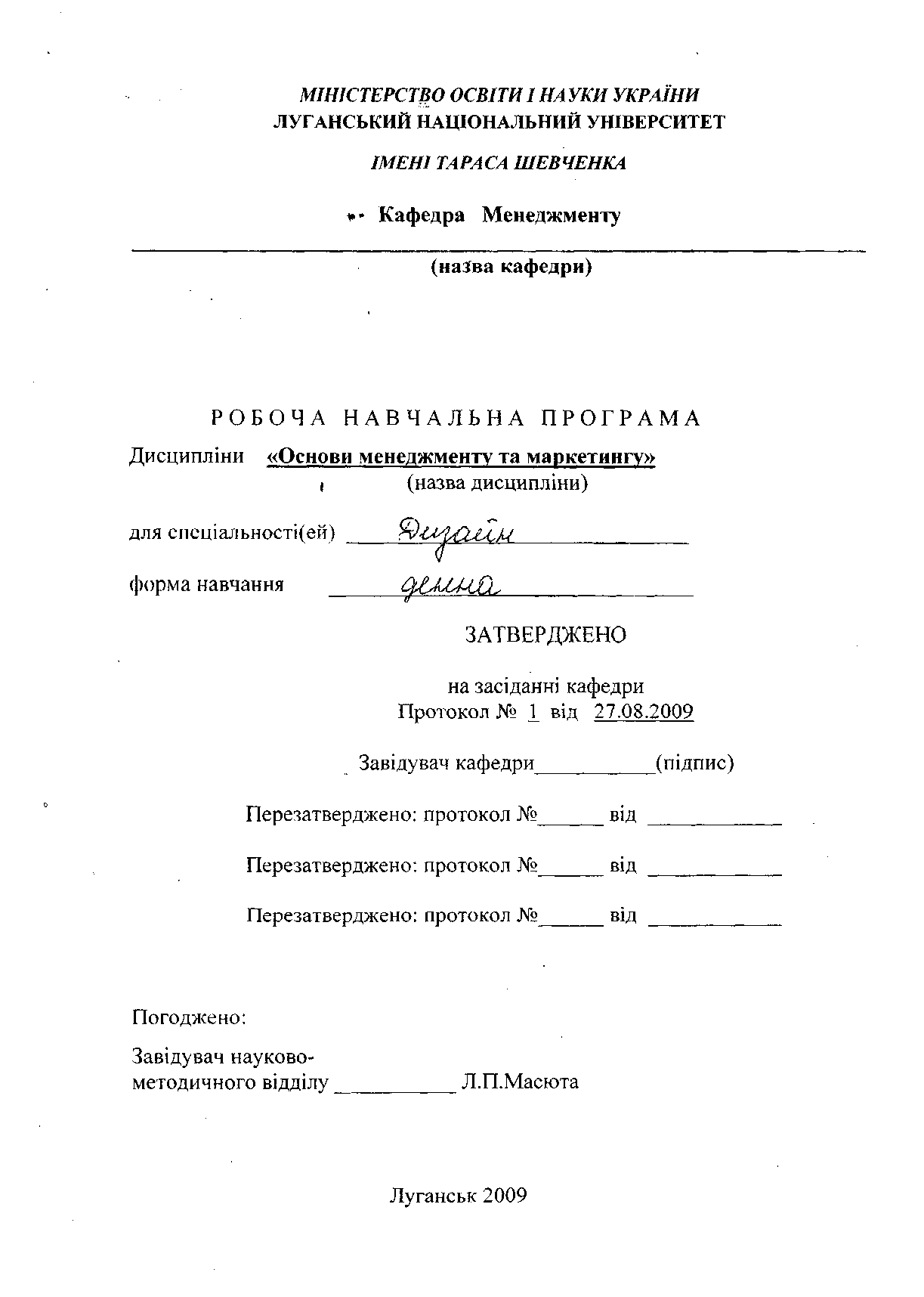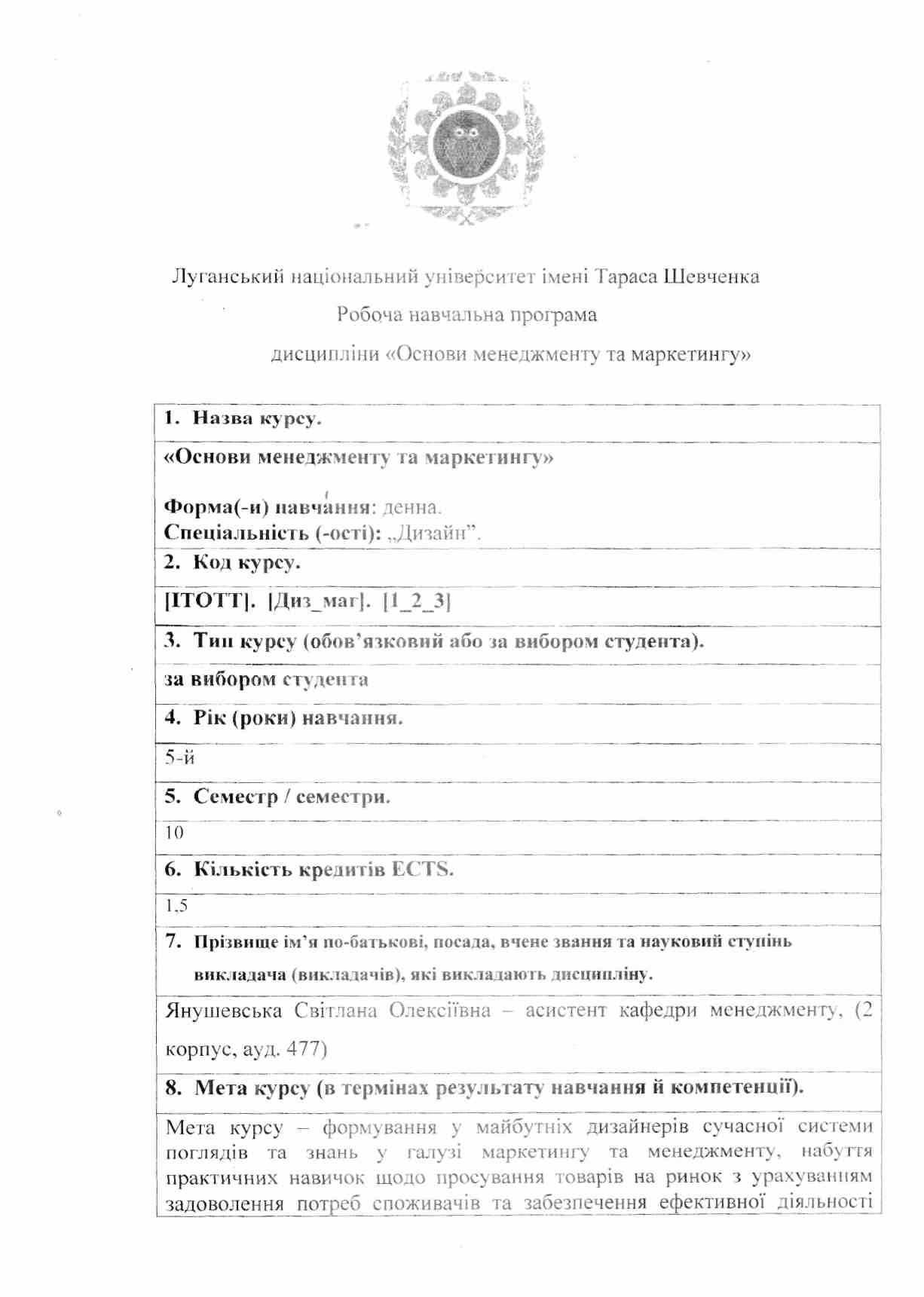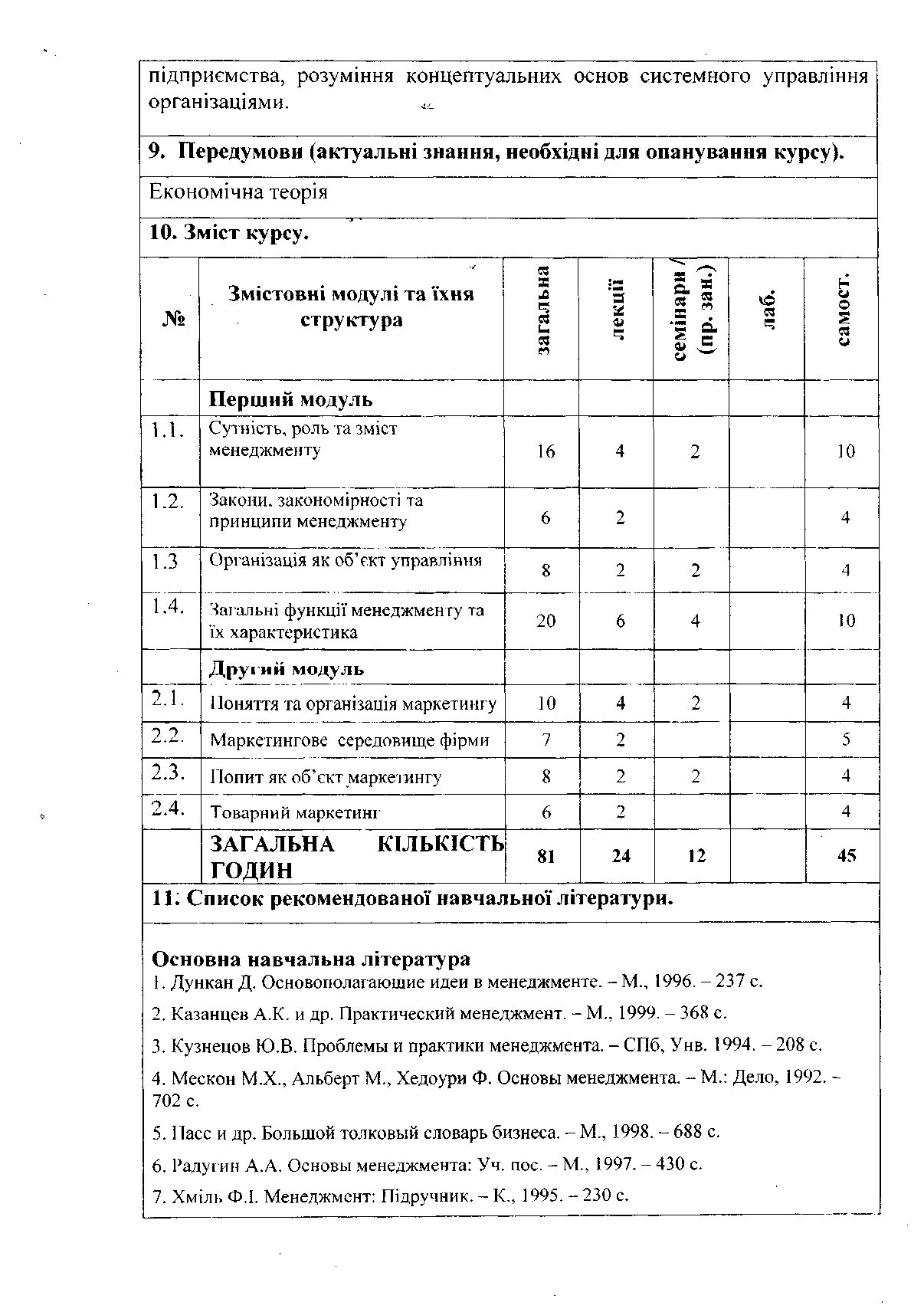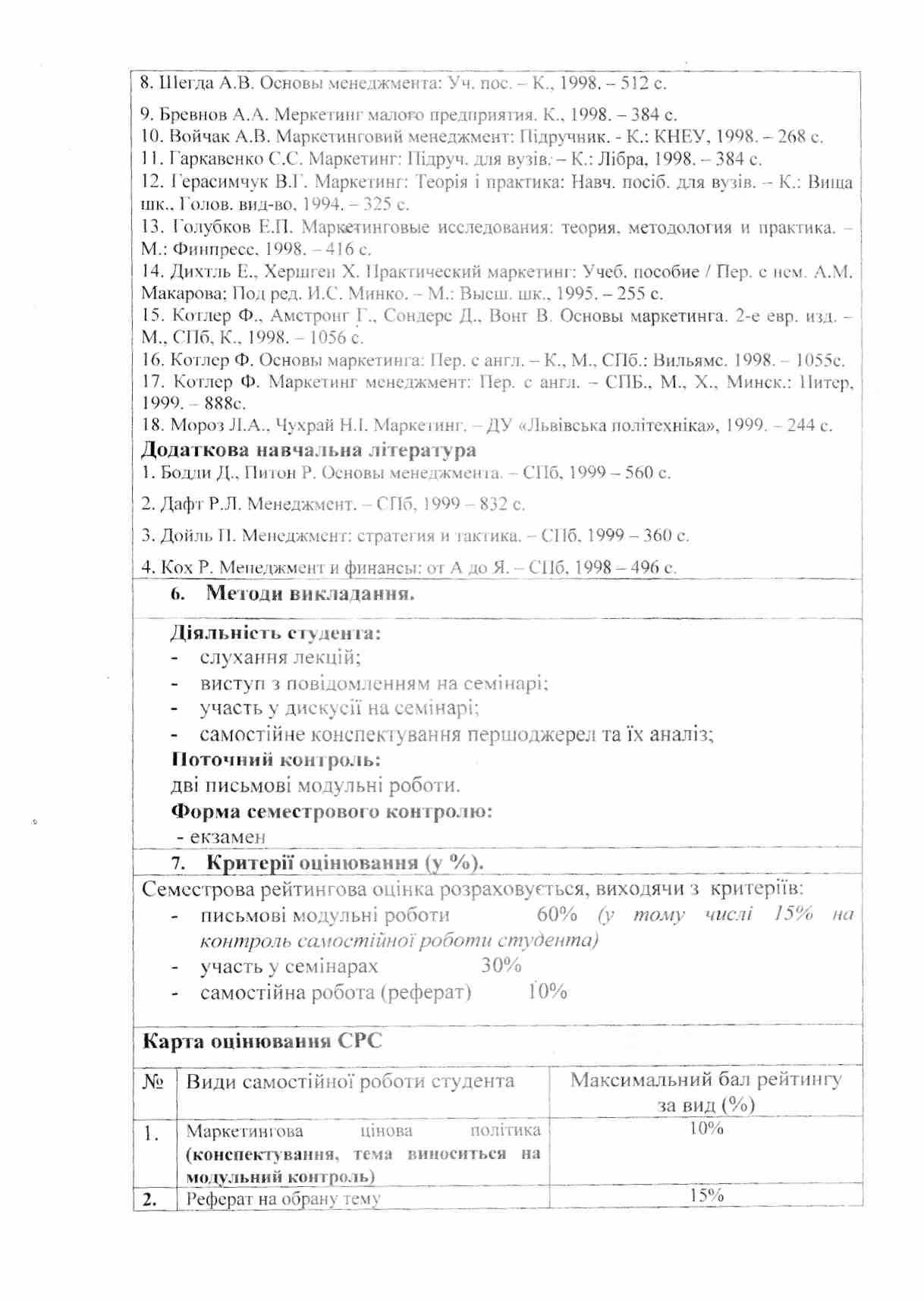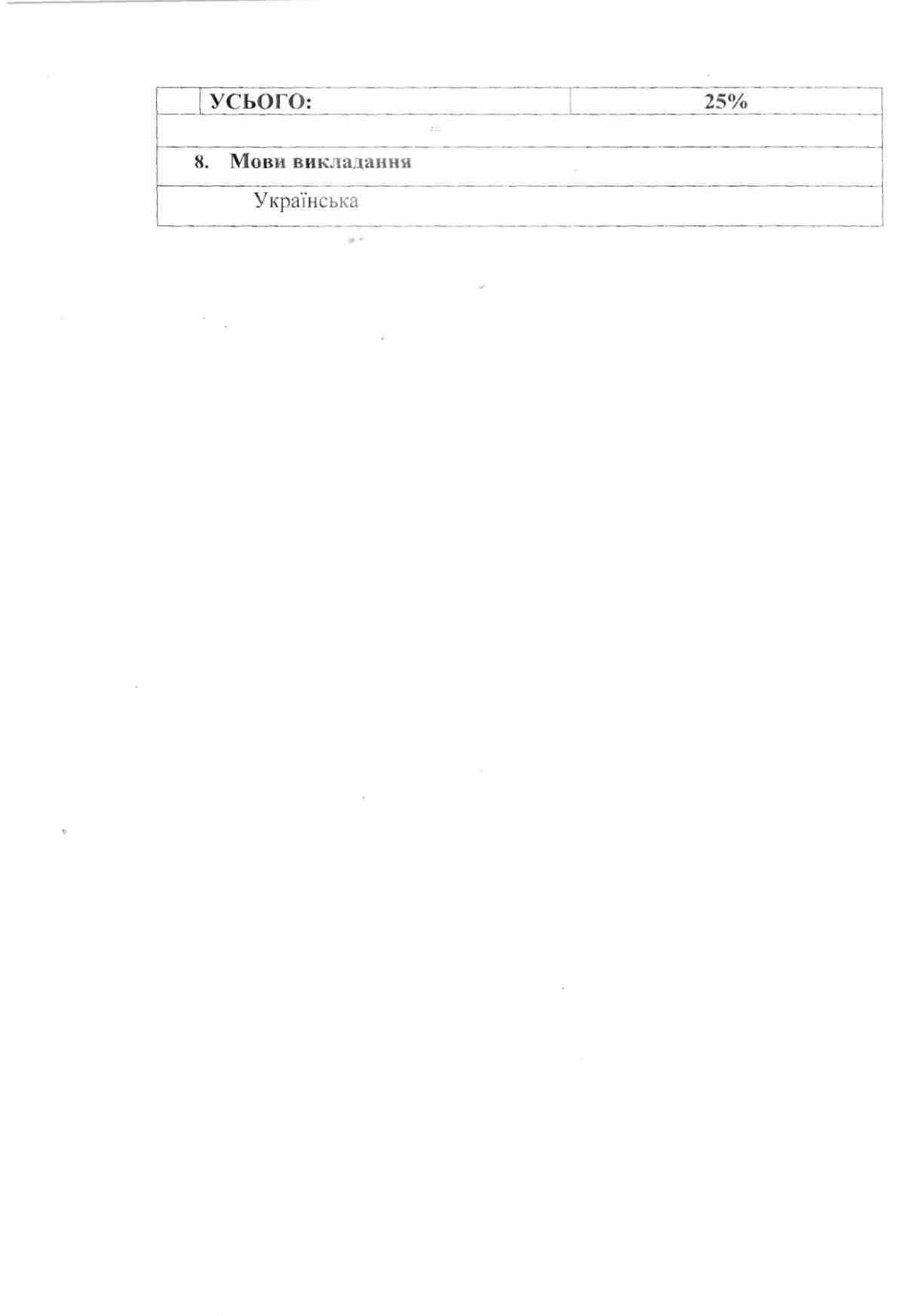2. Спеціальні вимоги до зарахування: для окр «магістр»
| Вид материала | Документы |
СодержаниеIntellectual property Working educational program Course objective (in terms of study results and competence). Background (actual knowledges, required for the course). Number of hours |
- Програма фахового вступного випробування для зарахування на навчання за окр «магістр», 195.61kb.
- 2. Спеціальні вимоги до зарахування, 1095.88kb.
- Програма фахового вступного випробування для зарахування на навчання за окр, 287.21kb.
- Програма фахового вступного випробування для зарахування на навчання за окр «магістр», 203.96kb.
- 2. Спеціальні вимоги до зарахування: історія України, українська мова І література, 6139.44kb.
- 2. Спеціальні вимоги до зарахування: історія України, українська мова І література, 5983.47kb.
- Програма фахового вступного випробування для зарахування на навчання за окр магістр, 366.63kb.
- Програма фахового вступного випробування для зарахування на навчання за окр «магістр», 942.13kb.
- Програма фахового вступного випробування для зарахування на навчання за окр «магістр», 165.71kb.
- 2. Спеціальні вимоги до зарахування, 6183.89kb.
WORKING EDUCATIONAL PROGRAM
^ INTELLECTUAL PROPERTY
for all graduate courses specialties
full-time study
APPROVED
at the chair meeting
Minutes No._1 d.d._28.08.2009
Head of the chair__________________
Re-approved: minutes No._____d.d._____________
Re-approved: minutes No._____d.d._____________
Re-approved: minutes No._____d.d._____________
Agreed:
Head of scientific and
methodical department __________L. Masjuta
Luhansk – 2009
Luhansk Taras Shevchenko National University
^ Working educational program
«Intellectual property»
| ||||||||||||||||||||||||||||||||||||||||||||||||||||||||||||||||||||||||||||||||||||||||||||||||
| «Intellectual property» Form of study: full-time Specialties: all | ||||||||||||||||||||||||||||||||||||||||||||||||||||||||||||||||||||||||||||||||||||||||||||||||
| ||||||||||||||||||||||||||||||||||||||||||||||||||||||||||||||||||||||||||||||||||||||||||||||||
| [ІПП].[Соц_Пед_Маг__09][ 1_2_4] | ||||||||||||||||||||||||||||||||||||||||||||||||||||||||||||||||||||||||||||||||||||||||||||||||
| ||||||||||||||||||||||||||||||||||||||||||||||||||||||||||||||||||||||||||||||||||||||||||||||||
| Compulsory | ||||||||||||||||||||||||||||||||||||||||||||||||||||||||||||||||||||||||||||||||||||||||||||||||
| ||||||||||||||||||||||||||||||||||||||||||||||||||||||||||||||||||||||||||||||||||||||||||||||||
| 1st | ||||||||||||||||||||||||||||||||||||||||||||||||||||||||||||||||||||||||||||||||||||||||||||||||
| ||||||||||||||||||||||||||||||||||||||||||||||||||||||||||||||||||||||||||||||||||||||||||||||||
| 1st (2nd) | ||||||||||||||||||||||||||||||||||||||||||||||||||||||||||||||||||||||||||||||||||||||||||||||||
| ||||||||||||||||||||||||||||||||||||||||||||||||||||||||||||||||||||||||||||||||||||||||||||||||
| 1,5 | ||||||||||||||||||||||||||||||||||||||||||||||||||||||||||||||||||||||||||||||||||||||||||||||||
| ||||||||||||||||||||||||||||||||||||||||||||||||||||||||||||||||||||||||||||||||||||||||||||||||
| Ladyga A. – Assistant Professor of ссылка скрыта, Candidate of Historical sciences (3rd building, aud. 4-11) | ||||||||||||||||||||||||||||||||||||||||||||||||||||||||||||||||||||||||||||||||||||||||||||||||
| ||||||||||||||||||||||||||||||||||||||||||||||||||||||||||||||||||||||||||||||||||||||||||||||||
| Course objective - mastering of knowledge, forming skills in intellectual property conceptual and theoretical foundations, in the methodology of theoretical knowledge practical application in copyright protection. Subject objective: study of global communication processes; definition of intellectual property criteria, legal regulation of relations between authors and users; intellectual property methodology; copyright functioning, application of new technologies in information relations; forming research skills in the field of intellectual property. | ||||||||||||||||||||||||||||||||||||||||||||||||||||||||||||||||||||||||||||||||||||||||||||||||
| ||||||||||||||||||||||||||||||||||||||||||||||||||||||||||||||||||||||||||||||||||||||||||||||||
| Science of law, fundamentals of computer science. | ||||||||||||||||||||||||||||||||||||||||||||||||||||||||||||||||||||||||||||||||||||||||||||||||
| ||||||||||||||||||||||||||||||||||||||||||||||||||||||||||||||||||||||||||||||||||||||||||||||||
| ||||||||||||||||||||||||||||||||||||||||||||||||||||||||||||||||||||||||||||||||||||||||||||||||
| ||||||||||||||||||||||||||||||||||||||||||||||||||||||||||||||||||||||||||||||||||||||||||||||||
| Main literature: 1. Intellectual property basics. – Кyiv, 1999. – 578 p. 2. Intellectual property: ссылка скрыта; 2 volumes. / Edited by О. Svjatoc'kyj. - Кyiv: Publishing house «In Jure», 2000. 3. Intellectual property in Ukraine: legal basics and practice: 4 volumes / Edited by О. Svjatoc'kyj. - Кyiv: Publishing house «In Jure». - 1999. 4. Mikul'onok І. Intellectual property basics: Study guide. ─ Кyiv: IVC „Publishing house „Polytechnic”, Lira-K, 2005. ─ 232 p. Additional literature
| ||||||||||||||||||||||||||||||||||||||||||||||||||||||||||||||||||||||||||||||||||||||||||||||||
| ||||||||||||||||||||||||||||||||||||||||||||||||||||||||||||||||||||||||||||||||||||||||||||||||
| Student’s activity:
Current control: written modular work. Form of a semester control: credit. | ||||||||||||||||||||||||||||||||||||||||||||||||||||||||||||||||||||||||||||||||||||||||||||||||
| ||||||||||||||||||||||||||||||||||||||||||||||||||||||||||||||||||||||||||||||||||||||||||||||||
| A semestral rating mark is based on the criteria:
| ||||||||||||||||||||||||||||||||||||||||||||||||||||||||||||||||||||||||||||||||||||||||||||||||
| ||||||||||||||||||||||||||||||||||||||||||||||||||||||||||||||||||||||||||||||||||||||||||||||||
| Ukrainian | ||||||||||||||||||||||||||||||||||||||||||||||||||||||||||||||||||||||||||||||||||||||||||||||||
